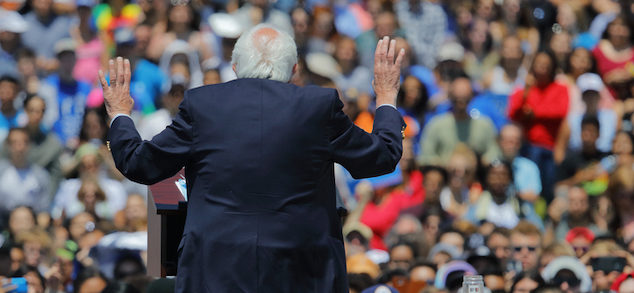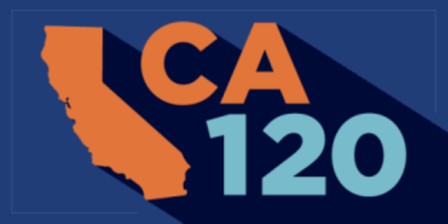News
Tracking poll: Sanders expands lead in March 3 primary
 Vermont Sen. Bernie Sanders at a rally in Ventura County during his 2016 run for president. (Photo: Joseph Sohm, via Shutterstock.
Vermont Sen. Bernie Sanders at a rally in Ventura County during his 2016 run for president. (Photo: Joseph Sohm, via Shutterstock.The final Capitol Weekly tracking poll is out. And it is finishing off with a bang.
Last month’s leader in California’s Democratic presidential primary, Vermont Sen. Bernie Sanders, is extending his lead, now up to 29%. The surge is seemingly drawing straight out of Massachusetts Sen.Elizabeth Warren who drops to 16%, just above the all-important 15% threshold.
The poll was conducted Feb. 6-9.

The survey finds former South Bend Mayor Pete Buttigieg in third place at 14 percent. Importantly for his campaign, this latest poll puts him within a single point of the 15-percent cutoff needed under California rules to earn statewide delegates to the Democratic National Convention,.
If Buttigieg can reach 15% on election day, that would net him 35 delegates, with 39 for Warren and 69 for Sanders.
Capitol Weekly CA120 February Tracking Poll Results (N=843 Weighted)
|
Respondents |
Share |
Change |
|
|
Bernie Sanders |
241 |
29% |
4% |
|
Elizabeth Warren |
135 |
16% |
-5% |
|
Peter Buttigieg |
120 |
14% |
3% |
|
Michael Bloomberg |
109 |
13% |
7% |
|
Joe Biden |
92 |
11% |
-10% |
|
Amy Klobuchar |
45 |
5% |
0.7% |
|
Andrew Yang |
31 |
4% |
-4% |
|
Tulsi Gabbard |
24 |
3% |
0.6% |
|
Tom Steyer |
24 |
3% |
1.1% |
Crosstabs can be found here.
Months ago we noticed when Buttigieg was the first candidate to get a second bump in the polls. Now, with his victory in the Iowa, he comes in for his third uptick in our polling, something no other candidate has enjoyed.
The New Hampshire primary is on Tuesday, and the results there may give both Sanders and Buttigieg an opportunity to frame this race as the leaders of each of their ideological lanes – Sanders taking the mantle on the left as a Democratic Socialist, and Buttigieg tacking to the middle with a moderating rhetoric that cuts into the Biden base.
New Hampshire is also an opportunity for Minnesota Sen. Amy Klobuchar to catch a wave, building off several strong debate performances. And as the senator from the neighboring state of Massachusetts, Warren could benefit from a surprise showing in New Hampshire.
The biggest change in our tracking poll comes at the expense of Biden, who is not poised to perform well in New Hampshire. He may not have a shot at a win until South Carolina’s primary on Feb. 29, with its significant African American population.
For many Super Tuesday states, those with elections on March 3, a win in South Carolina could prove pivotal.
Coming the Saturday before Super Tuesday, a big victory in that state could have an outsized impact on several states. However, with California’s early vote, and the expectation that 40-to-45% of California’s votes will already have come in, the impact will be muted.
Even if a Biden win in South Carolina could create a 10-point gain in the polls, making up for his drop this month, it would actually only net 5.5-points after accounting for the lost opportunity with voters who have already cast their ballots.
Some other takeaways from the polling:
It’s open season in the Central Valley where five candidates are bunched up earning between 14-to-22% of the vote. Some candidates have already found that trips to the smaller media markets such as Fresno and Bakersfield pay large earned media benefits, so expect to see some extra attention paid to these voters.
The “second choice” winner was Elizabeth Warren, who we have seen in other surveys would benefit greatly from any Sanders stumble, and 21% of voters named her their second choice. The candidate voters are most interested in learning more about is Buttigieg, the candidate who has been most consistently at the top of this measure. He is followed by Bloomberg, who voters also appear to want to learn more about.
Finally, if electability wasn’t a concern, most voters appear to stick by their initial choice. The rank-order of the first three candidates holds, only support for Biden and Bloomberg appear to significantly drop, which makes some logical sense as the issue of electability is one of their larger selling points.
This doesn’t mean that electability isn’t a concern – who can beat President Trump is likely still just as important of a factor.
But, possibly, voters have come up with ways to align their candidate choices with a theory as to how they can be successful in November.
—
Editor’s Note: Corrects date to Feb. 6-9 in 3rd graf, fixes byline to Howard sted Mitchell.
Want to see more stories like this? Sign up for The Roundup, the free daily newsletter about California politics from the editors of Capitol Weekly. Stay up to date on the news you need to know.
Sign up below, then look for a confirmation email in your inbox.

Leave a Reply